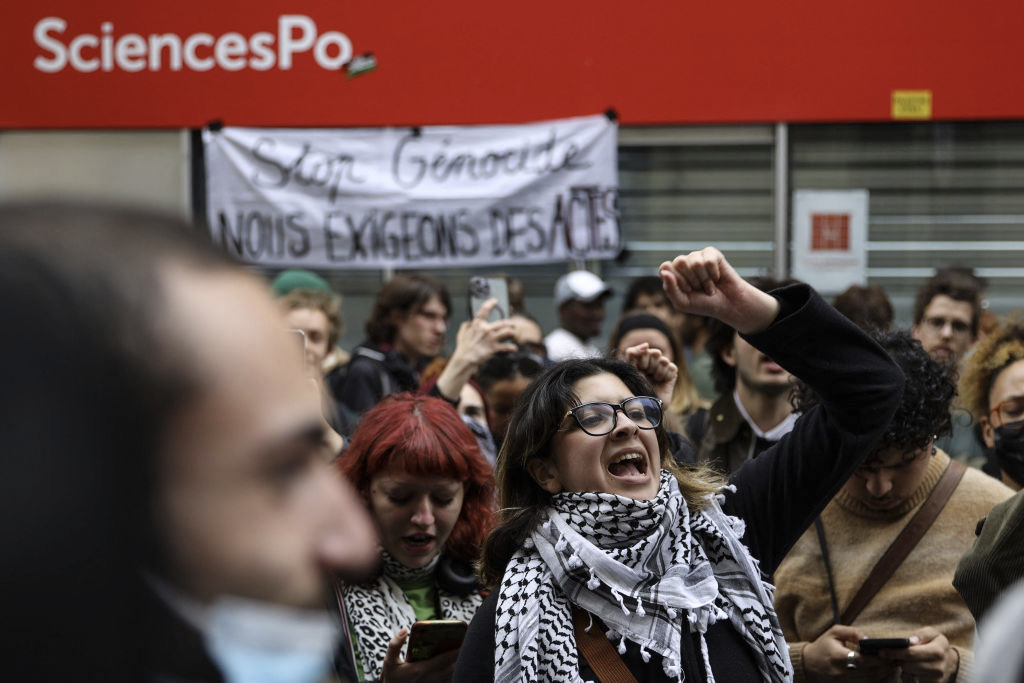 Dzisiejsi protestujący niewiele wiedzą o tym, przeciwko czemu się buntują, i przynajmniej z naszego doświadczenia, jakie wynika z rozmów z niektórymi z nich w Paryżu oraz czytania i/lub słuchania, co mówią ich odpowiednicy na amerykańskich kampusach, nawet nie chcą wiedzieć. Na zdjęciu: antyizraelscy protestujący przed paryskim Instytutem Studiów Politycznych (Sciences Po), 26 kwietnia 2024 r. (Zdjęcie: Antonin Utz/AFP via Getty Images)
Dzisiejsi protestujący niewiele wiedzą o tym, przeciwko czemu się buntują, i przynajmniej z naszego doświadczenia, jakie wynika z rozmów z niektórymi z nich w Paryżu oraz czytania i/lub słuchania, co mówią ich odpowiednicy na amerykańskich kampusach, nawet nie chcą wiedzieć. Na zdjęciu: antyizraelscy protestujący przed paryskim Instytutem Studiów Politycznych (Sciences Po), 26 kwietnia 2024 r. (Zdjęcie: Antonin Utz/AFP via Getty Images)
 Condorcet ozdobiony kefiją
Condorcet ozdobiony kefiją
Amir Taheri
Tłumaczenie: Małgorzata Koraszewska
Dla tych z nas, którzy są na tyle dorośli, że pamiętają dobre (lub złe) dni buntu studentów na zachodnich uniwersytetach w latach 60., obecne zamieszki na wielu europejskich i amerykańskich uniwersytetach wydają się kiepskim remakiem kontrowersyjnego oryginału.
Obecne zaburzenia mają znacznie mniejszą skalę.
W USA dotknęły one kilka uniwersytetów i przyciągnęły kilka tysięcy studentów z łącznej liczby ponad 15 milionów studentów.
We Francji centrum “powstania” jest paryski Instytut Studiów Politycznych (Sciences Po), w którym studiuje od 12 000 do 15 000 studentów, w tym jedna trzecia z zagranicy, z ponad 100 krajów.
Grupa Palestyny, która organizuje i przewodzi “powstaniu”, liczy około 200 członków, z czego od 50 do 60 bierze udział w akcjach obejmujących wybijanie szyb, blokowanie wejść i grożenie strajkiem głodowym.
Skromność liczb jest jednak rekompensowana obecnością mediów, która była niewyobrażalna w latach sześćdziesiątych.
Protesty w paryskim Instytucie Studiów Politycznych przyciągnęły kanały telewizyjne z ponad 50 krajów i często korzystały z relacji na żywo na kanale francusko-belgijskim.
Dodaj do tego niezliczone konta w stale rosnącej dżungli Internetu, a otrzymasz nagłośnienie, o jakim zbuntowana młodzież z lat 60. nie mogła marzyć.
Spędzanie większej części dnia wokół Sciences Po i rozmowy z wieloma protestującymi i studentami-obserwatorami “walki” ujawniły kolejny fakt: protest karmi się uwagą mediów. Gdy tylko kamery telewizyjne zostaną wyłączone, wykrzykiwanie haseł cichnie.
Powstania studenckie w latach 60. XX wieku były spowodowane dwiema kwestiami: wojną w Wietnamie i odrzuceniem dziedzictwa kulturowego, które część studentów uważała za relikt kolonializmu.
Amerykańscy studenci wzywający do zakończenia wojny w Wietnamie byli bezpośrednio zainteresowani tą kwestią, ponieważ nie chcieli zostać powołani do walki w czymś, co postrzegali jako krwawą wojnę domową w odległym kraju.
W grę wchodziły także bezpośrednie interesy protestujących studentów w Anglii i Francji.
W Anglii sztuka Johna Osborne’a “Look Back in Anger” [Spójrz wstecz z gniewem] zachęcała do buntu Edypa przeciwko Imperium Brytyjskiemu i jego paternalistycznej kulturze wiktoriańskiej, której kluczową cechą był kolonializm.
We Francji algierska wojna o niepodległość, postrzegana jako wojna domowa, ponieważ Algieria nigdy nie była kolonią w klasycznym sensie i stanowiła wówczas dwie francuskie prowincje, stworzyła szablon dla buntu, który później przekształcił się w majową rewolucję 1968 r.
Można argumentować, że protesty z lat 60. ostatecznie poniosły porażkę.
W Stanach Zjednoczonych jest możliwe, że protesty przedłużyły wojnę w Wietnamie o co najmniej cztery lata, przekonując cichą większość zszokowaną scenami chaosu do głosowania na Richarda Nixona, który za urojeniową radą Henry’ego Kissingera gonił za jakąś formą zwycięstwa jako preludium do pokoju. Po drodze administracja Nixona-Forda rozszerzyła wojnę na Laos i Kambodżę.
W Anglii ci, którzy spoglądali wstecz ze gniewem, szybko przekonali się, że z nudą muszą patrzeć w przyszłość.
We Francji protesty pomogły partyzantom Algérie française poszerzyć grono odbiorców i utrudnić chwiejnym rządom IV Republiki wynegocjowanie pokojowego wycofania się z prowincji Afryki Północnej, tak jak miało to miejsce w Maroku i Tunezji.
Z politycznego punktu widzenia “rewolucja” w Paryżu z maja 1968 r. również osiągnęła odwrotny skutek, niż oczekiwano, umożliwiając gaullistom utrzymanie monopolu na władzę polityczną przez kolejne 13 lat.
Studenccy rebelianci z lat 60. stworzyli neokolonialną narrację, w której Zachód jest odpowiedzialny za wszystko, co złe na świecie. To z kolei pozbawiło “resztę świata” jakiejkolwiek wolnej woli, redukując ją do przedmiotu w jej własnej historii.
Podczas wojny arabsko-izraelskiej w 1967 roku wiara ta przekonała zbuntowanych studentów do wspierania Izraela przeciwko jego arabskim sąsiadom.
W Paryżu studenci ozdobili Sciences Po flagami z gwiazdą Dawida i wykrzykiwali “Izrael Vaincra!” (“Izrael zwycięży”).
W Londynie, Nowym Jorku i Chicago Izrael był postrzegany jako ofiara “feudalnych reżimów arabskich” wspieranych przez dawną potęgę kolonialną Wielkiej Brytanii.
W tamtym czasie Izrael był ulubieńcem lewicy, ponieważ swoje narodziny zawdzięczał zbrojnej rebelii przeciwko brytyjskim kolonialistom, zdobywając jednocześnie potrzebną broń od bloku sowieckiego przez Czechosłowację za pieniądze pochodzące z Ameryki.
Szczególne miejsce Izraela na globalnej lewicy ilustruje zajmowane przez niego stanowisko wiceprezesa w Międzynarodówce Socjalistycznej.
Jeśli poparcie dla Izraela w tamtych czasach wynikało ze względów ideologicznych, które nie miały nic wspólnego z walką o przetrwanie, lustrzane odbicie tych samych względów inspiruje dzisiejszych studenckich rebeliantów na Zachodzie do występowania przeciwko Izraelowi.
Rozmawiając z niektórymi działaczami Sciences Po, można zobaczyć Izrael piętnowany jako “przyczółek amerykańskiego imperializmu” na Bliskim Wschodzie, a Benjamina Netanjahu jako kluczowego gracza w odrodzeniu się “twardej prawicy” w Europie i USA.
Dziś są jeszcze inne różnice.
W latach sześćdziesiątych studenccy buntownicy skupiali się na sprawach, w które bezpośrednio angażowały się ich rządy.
Dzisiaj każdy, kto uważa, że jakakolwiek potęga zachodnia mogłaby ustawić działania albo Izraela, albo Hamasu, potrzebuje odświeżającego kursu z psychologii politycznej. Rebelianci z Sciences Po mamroczą na temat “egzekwowania rezolucji ONZ” – rezolucji, które od ponad siedmiu dekad nie mają żadnego znaczenia.
W każdym razie, nawet gdyby wszystkie rezolucje ONZ zostały wdrożone, nie uspokoiłoby to Izraela i nie ugasiłoby pragnienia Hamasu stworzenia Palestyny “od rzeki do morza”.
Przez siedemdziesiąt lat Izraelczycy akceptowali “radę” Stanów Zjednoczonych i ich europejskich sojuszników, aby zaakceptować ostateczny koniec wojen zamiast zwycięstwa odniesionego na polu bitwy. Poza Hamasem, który chce wszystkiego, także Palestyńczycy zdali sobie sprawę, że słuchanie rad “życzliwych ludzi”, takich jak Jimmy Carter, Bill Clinton i George W. Bush, twórcy “mapy drogowej” prowadzącej do rozwiązania w postaci dwóch państw, nie zapewni im nawet pół państwa.
Może to zabrzmieć jak przepełniony nostalgią głos z przeszłości.
Jednak w dawnych, złotych czasach buntu na kampusach studenccy buntownicy poświęcali trochę czasu, by dowiedzieć się, przeciwko czemu protestują. Zamiast niszczyć meble w kampusie, organizowali tak zwane “nauczania”, aby omawiać i debatować na różne tematy oraz poznawać różne poglądy.
Dzisiejsi protestujący niewiele wiedzą o tym, przeciwko czemu się buntują, i przynajmniej z naszego doświadczenia, jakie wynika z rozmów z niektórymi z nich w Paryżu oraz czytania i/lub słuchania, co mówią ich odpowiednicy na amerykańskich kampusach, nawet nie chcą wiedzieć.
Tymczasem, gdy powiewają flagami lub palą je, a w Paryżu pomnik filozofa Condorceta ubierają w kefiję, w odległej krainie umierają ludzie.
Zawartość publikowanych artykułów i materiałów nie reprezentuje poglądów ani opinii Reunion’68,
ani też webmastera Blogu Reunion’68, chyba ze jest to wyraźnie zaznaczone.
Twoje uwagi, linki, własne artykuły lub wiadomości prześlij na adres:
webmaster@reunion68.com





